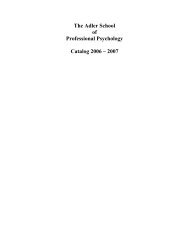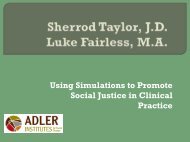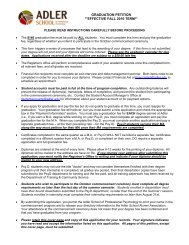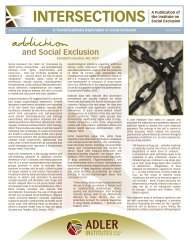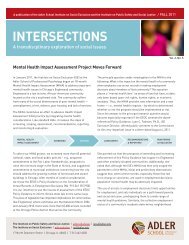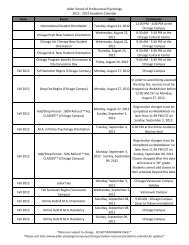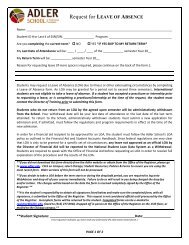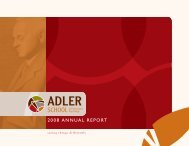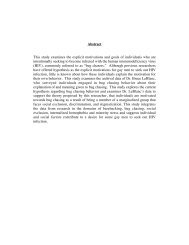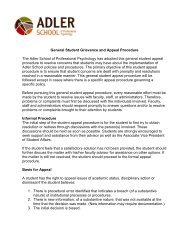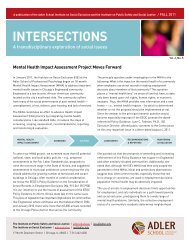Adler School of Professional Psychology Catalog 2008 – 2009
Adler School of Professional Psychology Catalog 2008 – 2009
Adler School of Professional Psychology Catalog 2008 – 2009
Create successful ePaper yourself
Turn your PDF publications into a flip-book with our unique Google optimized e-Paper software.
637 Statistics 3 Credits<br />
Prerequisite: 497. This course concerns concepts and applications <strong>of</strong> descriptive<br />
and inferential statistics and focuses on the statistical methods <strong>of</strong> data analysis,<br />
t-test, F-test, nonparametric statistics (Chi-square), the analysis <strong>of</strong> variance,<br />
multivariate analysis and other techniques. Particular attention is given to the<br />
application <strong>of</strong> research methodology to psychological problems and issues and<br />
to policy analysis and formulation.<br />
641 Social <strong>Psychology</strong> and Individual Differences 3 Credits<br />
This course examines, from a diversity perspective, the theories and concepts<br />
<strong>of</strong> social psychology. Factors related to individual and group identity such as<br />
age, gender, sexual orientation, race, ethnicity, socio-economic status and<br />
health status are examined to facilitate an understanding <strong>of</strong> the nature <strong>of</strong><br />
human behavior in groups, institutions and organizations. The course also<br />
considers society’s role, and the role <strong>of</strong> the dominant culture, in the<br />
construction and evolution <strong>of</strong> the self. Multiple determinants <strong>of</strong> behavior are<br />
addressed.<br />
644 Child and Adolescent Health and Dysfunction 3 Credits<br />
Prerequisites: 623, 683. The purpose <strong>of</strong> this course is to provide an<br />
understanding <strong>of</strong> the major psychological disorders <strong>of</strong> childhood and<br />
adolescence. The focus is on the interaction <strong>of</strong> biogenic, familial,<br />
environmental, and socio-cultural factors. The importance <strong>of</strong> individual<br />
differences and responsibility in utilizing DSM-IV diagnostic labels is stressed.<br />
647 Biopsychosocial Bases <strong>of</strong> Health 3 Credits<br />
and Dysfunction for Counselors<br />
This class is an overview <strong>of</strong> the major DSM-IV-TR Axis I and Axis II disorders,<br />
specifically the anxiety, mood, psychotic and personality disorders. The course<br />
focuses on the range <strong>of</strong> mental illnesses from adjustment reactions to serious<br />
psychopathologies. Topics will also include an overview <strong>of</strong> the etiology,<br />
developmental course, treatment, and policy/advocacy issues associated with<br />
each disorder, focusing on socially responsible practice.<br />
648 Biopsychosocial Bases <strong>of</strong> Health and Dysfunction I 3 Credits<br />
This course examines clinical manifestations <strong>of</strong> anxiety and personality<br />
disorders across the life cycle using a systems approach. Topics covered include<br />
phobias, trauma, personality disorders, psychosexual disorders, etiology, and<br />
treatment as well as personality traits in healthy development. Advocacy and<br />
policy issues regarding mental health and illness are also presented.<br />
649 Biopsychosocial Bases <strong>of</strong> Health and Dysfunction II 3 Credits<br />
This course presents clinical manifestations <strong>of</strong> serious mentally illness, including<br />
psychotic disorders such as schizophrenia and mood disorders such as major<br />
125



